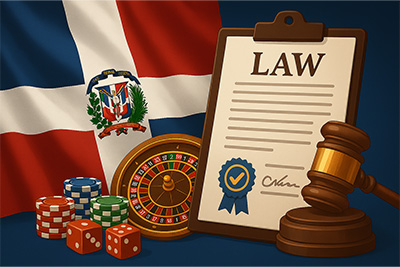 Dominican Republic President Luis Abinader has introduced a new bill that proposes the creation of a centralized regulatory authority to oversee all forms of gambling and betting activities. This initiative aims to strengthen the country’s gambling framework by establishing the General Directorate of Gaming (DGJA), which will fall under the Ministry of Finance. The bill, recently submitted to the National Congress, is designed to regulate everything from sports betting to casinos, online gambling, raffles, and electronic lotteries.
Dominican Republic President Luis Abinader has introduced a new bill that proposes the creation of a centralized regulatory authority to oversee all forms of gambling and betting activities. This initiative aims to strengthen the country’s gambling framework by establishing the General Directorate of Gaming (DGJA), which will fall under the Ministry of Finance. The bill, recently submitted to the National Congress, is designed to regulate everything from sports betting to casinos, online gambling, raffles, and electronic lotteries.
A Stronger Regulatory Body and Comprehensive Oversight
The creation of the DGJA is a direct response to the challenges in the Dominican gambling sector, which has seen rapid growth, especially in online platforms. The new authority will focus on registration, oversight, control, and licensing of gambling activities. This move comes after the country’s 2024 resolution, which set a more structured regulatory system for online sports betting and casinos.
The DGJA will have the power to enforce industry compliance, issue sanctions, and manage tax collection more effectively. In addition, the regulator will be responsible for cracking down on illegal gambling sites, implementing real-time betting systems, and developing safeguards against money laundering. The bill also establishes regulations for zoning, including setting exclusion areas near schools, hospitals, and other sensitive locations.
New Taxes and Fees for Gambling Operators
The bill also brings significant changes to the tax structure for gambling operators. Sports clubs will be required to pay a hefty fee of 794,000 Dominican pesos (around £9,915), along with an annual tax of 386,000 pesos (£4,820) in urban areas, plus an additional 1% tax on gross sales. Online gambling platforms will face either a 10% tax on their income or a fixed monthly fee of 5 million pesos (£62,434), pending the development of a more advanced monitoring system.
Land-basedcasinos will also face new fees, with charges depending on the number of gaming tables and slot machines. These fees will range from 14,000 pesos (£175) to 85,000 pesos (£1,061) per device or table. Licences issued under the new bill will be valid for five years and non-transferable for the first three years.
Provisions for Gambling Zones and Exclusion Areas
One of the most notable elements of the bill is the introduction of geographic restrictions designed to limit the social impact of gambling. Lottery kiosks will be prohibited from operating within 200 meters of schools, childcare centers, hospitals, churches, and government institutions. Sports betting establishments will have even stricter restrictions, requiring them to maintain a minimum distance of 500 meters from these sensitive locations.
These measures reflect the government’s intent to balance the growth of the gambling industry with social responsibility, reducing the risk of addiction and ensuring gambling operations are not easily accessible to vulnerable communities.
Gambling Licences and Additional Measures for Compliance
The new bill outlines strict licensing procedures for casinos and gambling operators. Only hotels rated four stars or higher will be eligible to operate casinos, and the licences granted will be valid for five years. The bill also establishes a detailed compliance framework for anti-money laundering, consumer protection, and the technical standards for gaming systems to ensure fairness and security.
The proposal also seeks to modernize the regulation of online gambling, bringing all virtual and land-based gambling under unified oversight. A penalty of up to 10 years in prison is suggested for those who violate the proposed gambling laws.
Next Steps for the Gambling Reform Bill
As the bill progresses through the legislative process, it is expected to undergo several revisions before being finalized. The government is keen on establishing a comprehensive, fair, and transparent gambling environment, aligning with international standards while taking into account the unique needs of the Dominican market.
Source:
Dominican Republic Introduces New Gambling Reform Bill, sbcnews.co.uk, June 20, 2025.
